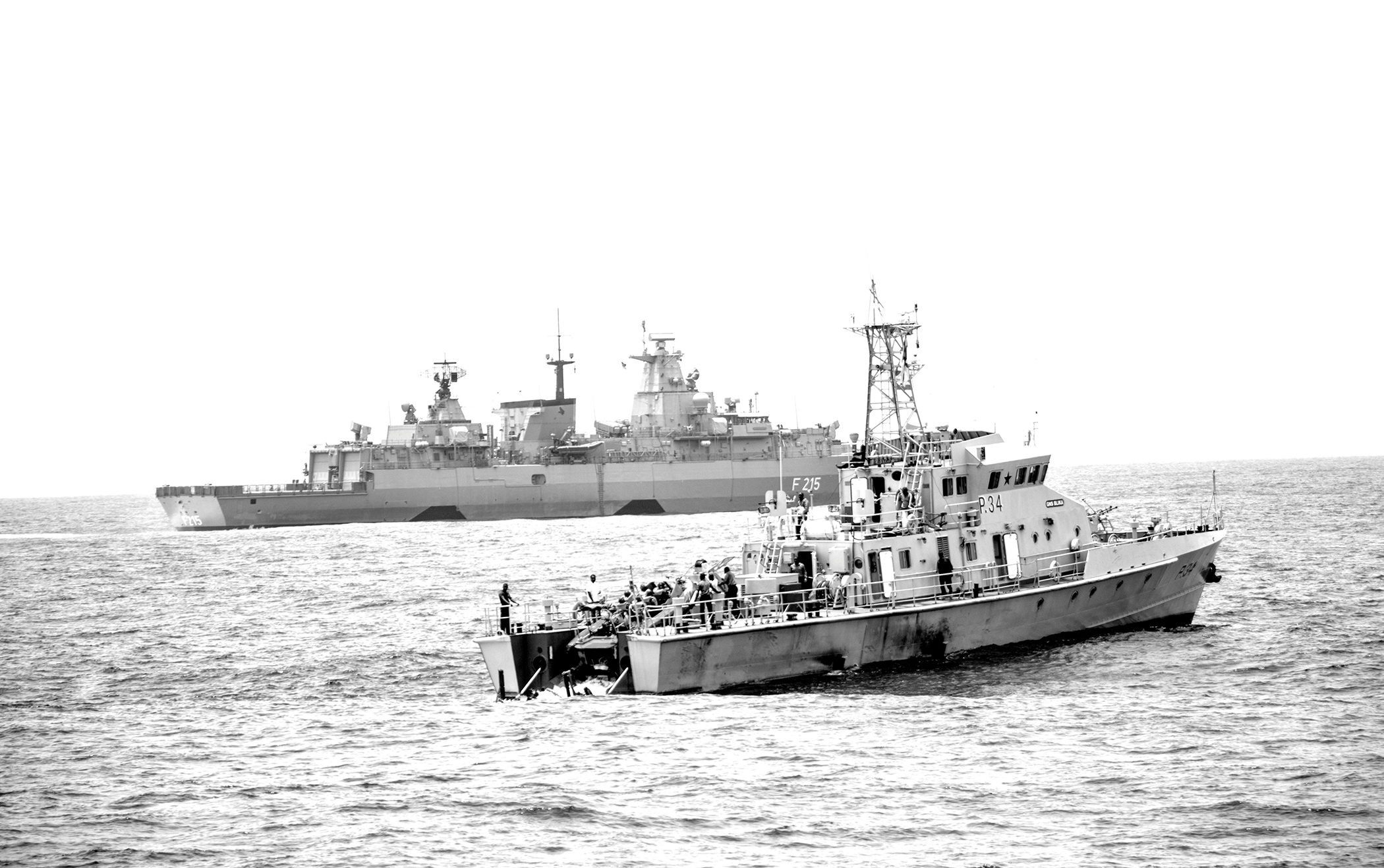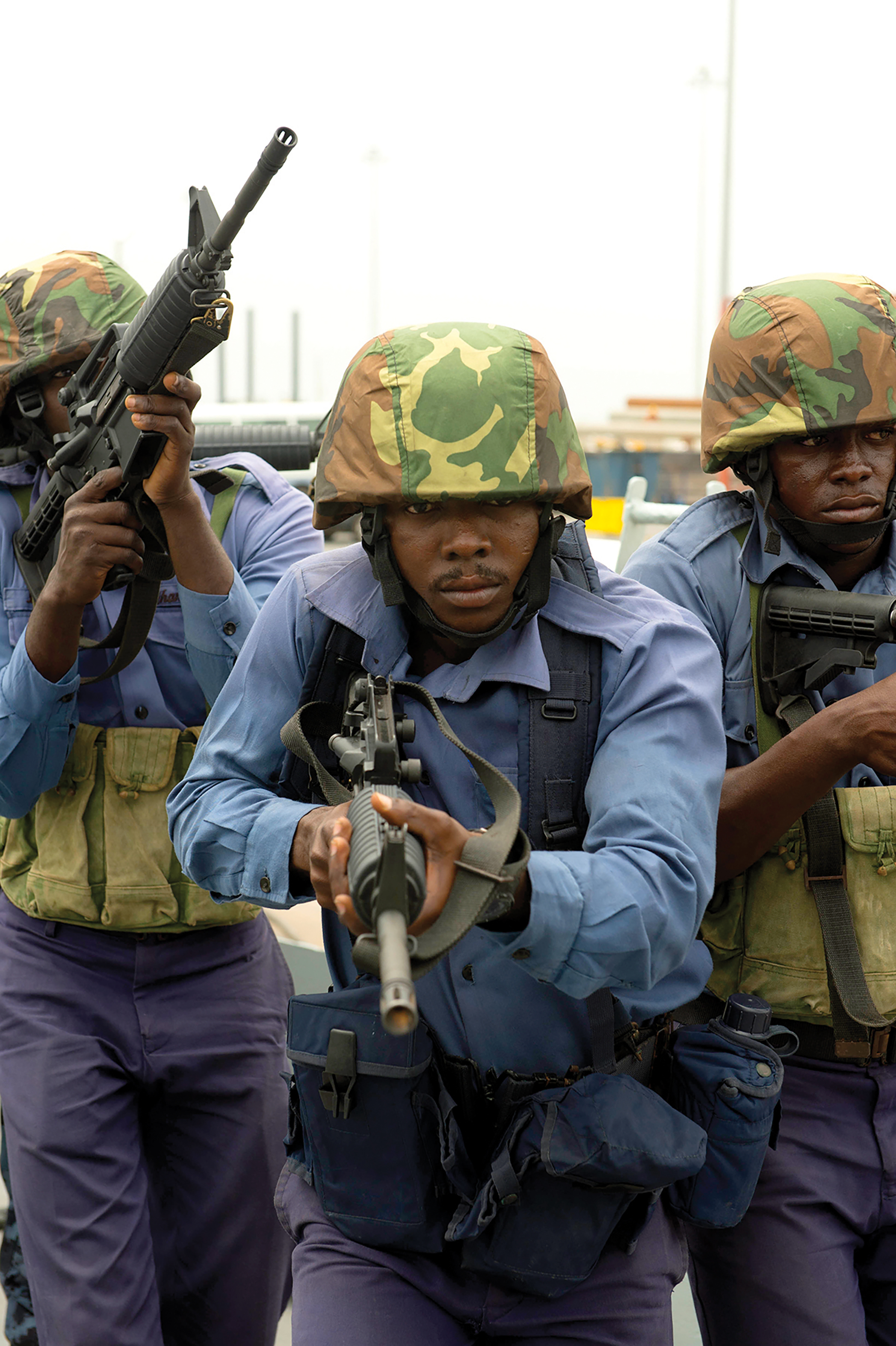The Discovery of Oil Brings With It A Need to Ensure Maritime Security
MUTARU MUMUNI MUQTHAR
 Mutaru Mumuni Muqthar is executive director of the West Africa Centre for Counter-Extremism, an independent civil society organization focused on counterterrorism research. He has a master’s degree in international terrorism, global crime and international security from Coventry University, United Kingdom, and a bachelor’s degree in business administration from Ashesi University, Ghana.
Mutaru Mumuni Muqthar is executive director of the West Africa Centre for Counter-Extremism, an independent civil society organization focused on counterterrorism research. He has a master’s degree in international terrorism, global crime and international security from Coventry University, United Kingdom, and a bachelor’s degree in business administration from Ashesi University, Ghana.
As piracy off the Horn of Africa has decreased, the focus has shifted to the Gulf of Guinea, a coast stretching
2,500 kilometers from Cape Lopez in Gabon north to Cape Three Points in western Ghana. Ghana discovered about
5 billion barrels of oil reserves in 2007, bringing with it security concerns about piracy, terrorism, smuggling and continental shelf disputes with neighboring countries. In no area has the threat been more pronounced than in maritime piracy. During 2012-2013, reported piracy incidents in the Gulf of Guinea exceeded those recorded in the Horn of Africa, according to the United Nations Office on Drugs and Crime (UNODC).
A booming black market for fuel in West Africa makes these waters attractive to pirates. Oil is the single most important product of economic trade transported mainly via sea in the West Africa region. More than 90 percent of all cargo trade is conducted by sea, and the trade is organized in such a way that it leaves room for a black market to thrive.
Ghana’s vulnerability is not in doubt. “The whole of Ghana is prone to piracy,” said David Asante-Apeatu, Ghana’s commissioner for Marine Police. “This is more true following the country’s discovery of oil.’’ Maritime piracy is an imminent threat, but not unique to Ghana, according to James Agalga, the country’s deputy minister for the interior. In fact, there were two piracy incidents associated with Ghana in 2014. These pirates originate principally from Nigeria, with a small number from Benin and Togo. According to UNODC, pirate victims off the coast of Benin have confirmed English- and French-speaking pirates working together, indicating a criminal network that crosses borders. Nigeria recorded 57 of the reported 73 incidents during 2013, according to UNODC. It is easy to assume that the next target might be Ghana.
Agalga is well aware of this, but he asserts that Ghana’s waters have become extremely dangerous for pirates, given the country’s preparedness. “Once you retool the Navy and Army, the next important tool is to prioritize agency collaboration and strengthen focus on information sharing,” Agalga said. “The important thing at present is to ensure increased capacity to monitor both territorial and international waters with joint patrol teams from neighboring countries when and where possible.”

There is innate pressure on Ghana to prevent the conditions experienced by other West African countries. But, according to authorities, Ghana is a ways off from experiencing the same problems that Nigeria has faced. A common argument is that there are significant differences between the two domains. Although oil thieves gross about $1 billion from onshore bunkering annually in Nigeria, there is less chance of cutting through pipelines to siphon oil in Ghana because most of the country’s oil is offshore. Joana Ama Osei-Tutu of the Kofi Annan International Peacekeeping Training Centre in Ghana relates the fundamental differences: “Ghana has a clearer coast, no creeks, and is quite clear and secure,” she said, referring to the fact that Nigeria’s coastline is punctuated by multiple waterway entry points that can be used by pirates and traffickers.
Preparedness and Capacity
Agalga said Ghana is not just counting on the benevolence of partner nations. The Ghana Maritime Authority (GMA) has launched a modern vessel traffic management information system (VTMIS). The integrated system is meant for continuous electronic surveillance of Ghana’s maritime space and has remote sensors with the capacity to detect and identify ships and boats on the high seas. It has communication towers equipped with marine radar, automatic identification systems, and closed-circuit television systems to monitor vessels and onboard activities far afield.
The project consists of eight remote sensor sites at Tema, Winneba, Keta, Axim, Big Ada, Half Assini, Takoradi and Cape Coast, as well as three remote base stations at Keta Krachi, Yeji and Anum. The National Control Centre is at the headquarters of the GMA in Accra. An automatic identification system for vessels and crafts operating on the Volta Lake and a long-range identification and tracking of ships’ functionality and weather sensors are included on ships. VTMIS deployed by the Finnish company ELTEL Networks Corp. can track vessels within a range of 1,000 nautical miles.
However, many challenges remain. The VTMIS alone is inadequate to eliminate the threat of piracy. The ability to thwart attacks is as important as spotting the attack, if not more so. Although the floating production storage and offloading vessels are about 200 nautical miles away, Ghana’s small boats are unable to go more than 100 nautical miles from shore. Bigger vessels are required to provide adequate cover to successfully overcome or fight off pirates. “We need logistics to be able to cover our territorial waters; we need offshore vessels to be able to patrol our waters,” Asante-Apeatu said.

There is suspicion of possible friction among agencies involved in the sector. Osei-Tutu noted that the security setup is characterized by fragmented agencies, such as the Maritime Police, GMA, Navy, and Ports and Harbours Authority. All these working under separate ministries and agencies lead to duplication of duties and risk marring the good will required to counter piracy. In Asante-Apeatu’s assessment, however, “We are able to do joint patrols adequately supporting each other; the Marine Police, the Navy, the Maritime Authority. There is a relatively high cordial relationship amongst security agencies.”
Implications for Maritime Trade for Ghana
Piracy has significant economic implications. It raises the risk level and causes insurance companies to increase their rates. An increase in piracy off Ghana’s coast could have a significant effect on international insurance rates for importers and exporters, and increase the cost of doing business at the country’s ports. In Benin, the UNODC observes that an upsurge in attacks in 2011 resulted in the international maritime insurance adjusters placing Benin’s waters under the same risk profile as Nigeria’s. This significantly increased the cost of shipping to Benin. The increase in the cost of imports reduces revenues, increases the cost of living, and results in a decrease in competitiveness of imports.
Conclusion
Ghana can avoid the same fate. Stable and secure waters will require a deliberate and comprehensive security architecture that involves the Navy, Marine Police, GMA, Army, Interior Ministry and other allied institutions. Strengthening the capability of the security forces to increase patrols and surveillance will serve as a strong deterrent.
Companies operating vessels should be required to have a master security plan containing onboard defensive measures, a compulsory presence of armed security teams aboard vessels, modern technology tracking, and monitoring devices such as the VTMIS. Discipline within the forces and a resolve to stamp out corruption are critical to bringing safety and order to the sector.
Finally, there is a correlation between economic and social problems on shore and the incidence of crime off shore. The country needs to tackle underlying economic and social problems that can produce security threats. A group of peasant fishermen, farmers and youths along the coast could be enticed by foreign pirates and by the allure of money to join the illegal trade. Recruiters could harness local discontent against authorities by enticing young people to engage in piracy, maritime robbery or both. A longer-term vision will require that Ghana set up a Coastal Development Authority to oversee the security and development of coastal life and resources.

